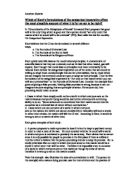According to Kant, the highest form of good is good will. He mentioned that good will is carrying out one's duty and doing only the actions which are morally required whilst avoiding any thought of the benefits that will be achieved which are considered to be morally wrong. A duty is good because it is good within itself meaning that one does his duty due to the fact that it is his solely one's duty.
With the awareness of happiness, Kant accepted that happiness is also good however one should behave with the idea that happiness will come from one's actions however if it doesn't bring about happiness then it still means that one has to carry out the act therefore, meaning that duty is the highest good.
One dilemma that occurs with this idea is if a murderer is after a friend who is hiding in one's house, upon question of one's where a bout’s is it permissible to lie? Kant's answer to this would be not to lie as lying breaks one's moral duty and one's duty is the highest possible good that exists and therefore it seems that it does not make sense to lie. Kantian ethics also states that duty and reason should control one's emotions rather than it being the other way around.
The categorical imperative assists one to know which acts are prohibited and which are compulsory. The categorical imperative tells one what should be done. They are categorical because they are prescriptive and awareness is a reason for doing something and therefore moral statements are categorical as they prescribe behaviour and ignoring the outcome. The categorical imperative s split into three sub-sections, the universal law, humans as ends and not as means and the kingdom of ends which refers to one acting in a way that assumes that everyone else will act in the correct way.
To make a rule universal one must be able to put themselves into the positions of others meaning that the person who is about to carry out a certain act must not do so unless he/she is certain that all others in the same situation should carry out that specific act in the same manner. This ultimately means that in order for a law to be moral it must be universalised. R.M Hare describes how to test a rule by understanding the consequences on affected individuals, then to imagine yourself in the position of others and finally to ask if the rule should be followed for everyone involved in the situation. The treatment towards humans that is considered to be acceptable is unique as humans are the highest forms of creation. Such treatment includes every individual developing intellectually, morally and physically. Humans must also seek happiness upon each other evenly rather than giving someone more happiness and joy whilst another becomes sad or takes away one's freedom. The third principle of the categorical imperative states that all humans must treat each other as ends meaning that humans must treat themselves for the sake of others and not to use others for your own intentional benefit therefore certain rules can not be created such as lying to others because they do to you because everyone would become unbearable within society.









